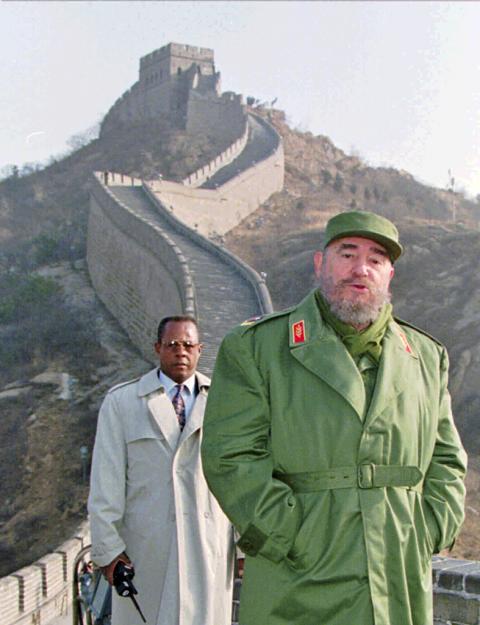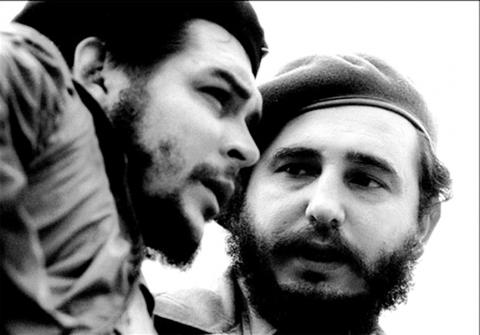Former Cuban president Fidel Castro, who led a rebel army to improbable victory in Cuba, embraced Soviet-style communism and defied 10 US presidents during his half-century rule, has died at age 90.
Cuba yesterday declared nine days of public mourning for its late revolutionary leader and said his ashes are to be buried at a ceremony on Sunday next week in Santiago de Cuba.
From yesterday until Sunday next week, “public activities and shows will cease, the national flag will fly at half mast on public buildings and military installations,” a statement from the Cuban Executive Committee said.

Photo: AP
Castro’s ashes are to be buried in the historic southeastern city after a four-day procession through the country, it added.
With a shaking voice, Cuban President Raul Castro said on state television that his elder brother died at 10:29pm on Friday.
He ended the announcement by shouting the revolutionary slogan: “Toward victory, always!”

Photo: AFP / ROBERTO SALAS / CUBADEBATE
Fidel Castro’s reign over the island-nation 145km from Florida was marked by the US-backed Bay of Pigs invasion in 1961 and the Cuban Missile Crisis a year later that brought the world to the brink of nuclear war.
The bearded revolutionary, who survived a crippling US trade embargo as well as dozens, possibly hundreds, of assassination plots, died 10 years after ill health forced him to hand power over to Raul Castro.
Fidel Castro overcame imprisonment at the hands of former Cuban president Fulgencio Batista, exile in Mexico and a disastrous start to his rebellion before triumphantly riding into Havana in January 1959 to become, at age 32, the youngest leader in Latin America.
For decades, he served as an inspiration and source of support to revolutionaries from Latin America to Africa.
His commitment to socialism was unwavering, though his power finally began to fade in the middle of 2006 when a gastrointestinal ailment forced him to hand over the presidency to Raul Castro in 2008, provisionally at first and then permanently.
His defiant image lingered long after he gave up his trademark Cohiba cigars for health reasons and his tall frame grew stooped.
“Socialism or death” remained Castro’s rallying cry even as Western-style democracy swept the globe and other communist regimes in China and Vietnam embraced capitalism, leaving this island of 11 million people an economically crippled Marxist curiosity.
He survived long enough to see Raul Castro negotiate an opening with US President Barack Obama on Dec. 17, 2014, when Havana and Washington announced they would move to restore diplomatic ties for the first time since they were severed in 1961.
He cautiously blessed the historic deal with his lifelong enemy nation in a letter published after a month-long silence.
Obama made a historic visit to Havana in March this year.
Carlos Rodriguez, 15, was sitting in Havana’s Miramar neighborhood when he heard that Fidel Castro had died.
“That’s not what I was expecting. One always thought that he would last forever. It doesn’t seem true.”
“It’s a tragedy,” said 22-year-old nurse Dayan Montalvo. “We all grew up with him. I feel really hurt by the news that we just heard.”
Fidel Castro Ruz was born on Aug. 13, 1926, in eastern Cuba’s sugar country, where his Spanish immigrant father worked recruiting labor for US sugar companies and later built up a prosperous plantation of his own.
Castro attended the University of Havana, where he received law and social science degrees. His life as a rebel began in 1953 with a reckless attack on the Moncada military barracks in Santiago. Most of his comrades were killed and Fidel and Raul went to prison.
He turned his trial defense into a manifesto that he smuggled out of jail, famously declaring, “History will absolve me.”
Freed under a pardon, Fidel Castro fled to Mexico and organized a rebel band that returned in 1956, sailing across the Gulf of Mexico to Cuba on a yacht named Granma. After losing most of his group in a bungled landing, he rallied support in Cuba’s Sierra Maestra mountains.
Three years later, tens of thousands spilled into the streets of Havana to celebrate Batista’s downfall and catch a glimpse of Castro as his rebel caravan arrived in the capital on Jan. 8, 1959.
The US was among the first to formally recognize his government.
The revolution thrilled millions in Cuba and across Latin America who saw it as an example of how the seemingly arrogant Americans could be defied.

A car bomb killed a senior Russian general in southern Moscow yesterday morning, the latest high-profile army figure to be blown up in a blast that came just hours after Russian and Ukrainian delegates held separate talks in Miami on a plan to end the war. Kyiv has not commented on the incident, but Russian investigators said they were probing whether the blast was “linked” to “Ukrainian special forces.” The attack was similar to other assassinations of generals and pro-war figures that have either been claimed, or are widely believed to have been orchestrated, by Ukraine. Russian Lieutenant General Fanil Sarvarov, 56, head

SAFETY FIRST: Double the number of police were deployed at the Taipei Marathon, while other cities released plans to bolster public event safety Authorities across Taiwan have stepped up security measures ahead of Christmas and New Year events, following a knife and smoke bomb attack in Taipei on Friday that left four people dead and 11 injured. In a bid to prevent potential copycat incidents, police deployments have been expanded for large gatherings, transport hubs, and other crowded public spaces, according to official statements from police and city authorities. Taipei Mayor Chiang Wan-an (蔣萬安) said the city has “comprehensively raised security readiness” in crowded areas, increased police deployments with armed officers, and intensified patrols during weekends and nighttime hours. For large-scale events, security checkpoints and explosives

A magnitude 7.0 earthquake struck off Yilan at 11:05pm yesterday, the Central Weather Administration (CWA) said. The epicenter was located at sea, about 32.3km east of Yilan County Hall, at a depth of 72.8km, CWA data showed There were no immediate reports of damage. The intensity of the quake, which gauges the actual effect of a seismic event, measured 4 in Yilan County area on Taiwan’s seven-tier intensity scale, the data showed. It measured 4 in other parts of eastern, northern and central Taiwan as well as Tainan, and 3 in Kaohsiung and Pingtung County, and 2 in Lienchiang and Penghu counties and 1

‘POLITICAL GAME’: DPP lawmakers said the motion would not meet the legislative threshold needed, and accused the KMT and the TPP of trivializing the Constitution The Legislative Yuan yesterday approved a motion to initiate impeachment proceedings against President William Lai (賴清德), saying he had undermined Taiwan’s constitutional order and democracy. The motion was approved 61-50 by lawmakers from the main opposition Chinese Nationalist Party (KMT) and the smaller Taiwan People’s Party (TPP), who together hold a legislative majority. Under the motion, a roll call vote for impeachment would be held on May 19 next year, after various hearings are held and Lai is given the chance to defend himself. The move came after Lai on Monday last week did not promulgate an amendment passed by the legislature that